Editor’s Note: The following comprises the fifth chapter of The Holy Roman Empire, by James Bryce (published 1871). All spelling in the original.
(Continued from Part 4)
CHAPTER V
EMPIRE AND POLICY OF CHARLES
The coronation of Charles is not only the central event of the Middle Ages, it is also one of those very few events of which, taking them singly, it may be said that if they had not happened, the history of the world would have been different. In one sense indeed it has scarcely a parallel. The assassins of Julius Cæsar thought that they had saved Rome from monarchy, but monarchy came inevitable in the next generation. The conversion of Constantine changed the face of the world, but Christianity was spreading fast, and its ultimate triumph was only a question of time. Had Columbus never spread his sails, the secret of the western sea would yet have been pierced by some later voyager: had Charles V broken his safe-conduct to Luther, the voice silenced at Wittenberg would have been taken up by echoes elsewhere. But if the Roman Empire had not been restored in the West in the person of Charles, it would never have been restored at all, and the inexhaustible train of consequences for good and for evil that followed could not have been. Why this was so may be seen by examining the history of the next two centuries. In that day, as through all the Dark and Middle Ages, two forces were striving for the mastery. The one was the instinct of separation, disorder, anarchy, caused by the ungoverned impulses and barbarous ignorance of the great bulk of mankind; the other was that passionate longing of the better minds for a formal unity of government, which had its historical basis in the memories of the old Roman Empire, and its most constant expression in the devotion to a visible and catholic Church. The former tendency, as everything shews, was, in politics at least, the stronger, but the latter, used and stimulated by an extraordinary genius like Charles, achieved in the year 800 a victory whose results were never to be lost. When the hero was gone, the returning wave of anarchy and barbarism swept up violent as ever, yet it could not wholly obliterate the past: the Empire, maimed and shattered though it was, had struck its roots too deep to be overthrown by force, and when it perished at last, perished from inner decay. It was just because men felt that no one less than Charles could have won such a triumph over the evils of the time, by framing and establishing a gigantic scheme of government, that the excitement and hope and joy which the coronation evoked were so intense. Their best evidence is perhaps to be found not in the records of that time itself, but in the cries of lamentation that broke forth when the Empire began to dissolve towards the close of the ninth century, in the marvellous legends which attached themselves to the name of Charles the Emperor, a hero of whom any exploit was credible, in the devout admiration wherewith his German successors looked back to, and strove in all things to imitate, their all but superhuman prototype.
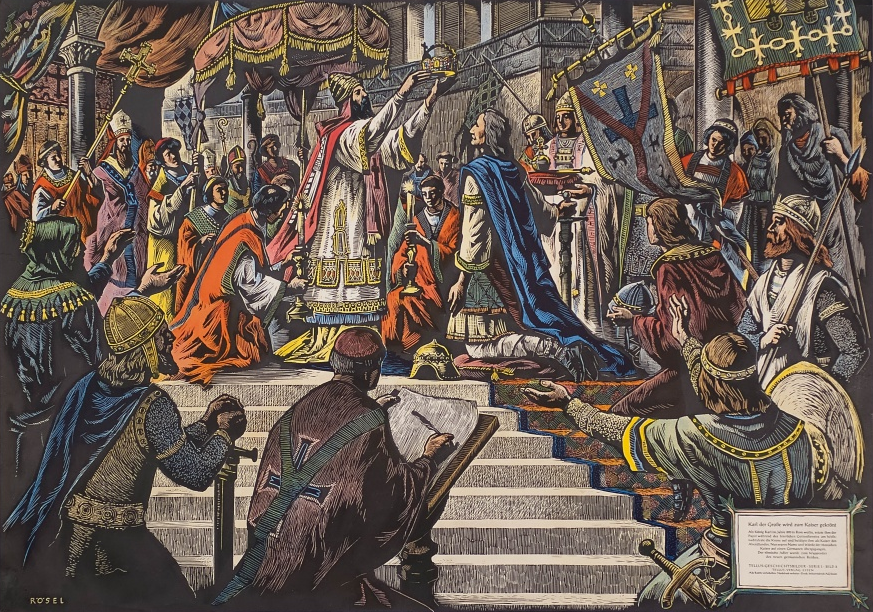
Import of the coronation
As the event of A.D. 800 made an unparalleled impression on those who lived at the time, so has it engaged the attention of men in succeeding ages, has been viewed in the most opposite lights, and become the theme of interminable controversies. It is better to look at it simply as it appeared to the men who witnessed it. Here, as in so many other cases, may be seen the errors into which jurists have been led by the want of historical feeling. In rude and unsettled states of society men respect forms and obey facts, while careless of rules and principles. In England, for example, in the eleventh and twelfth centuries, it signified very little whether an aspirant to the throne was next lawful heir, but it signified a great deal whether he had been duly crowned and was supported by a strong party. Regarding the matter thus, it is not hard to see why those who judged the actors of A.D. 800 as they would have judged their contemporaries should have misunderstood the nature of that which then came to pass. Baronius and Bellarmine, Spanheim and Conring, are advocates bound to prove a thesis, and therefore believing it; nor does either party find any lack of plausible arguments. But civilian and canonist alike proceed upon strict legal principles, and no such principles can be found in the case, or applied to it. Neither the instances cited by the Cardinal from the Old Testament of the power of priests to set up and pull down princes, nor those which shew the earlier Emperors controlling the bishops of Rome, really meet the question. Leo acted not as having alone the right to transfer the crown; the practice of hereditary succession and the theory of popular election would have equally excluded such a claim; he was the spokesman of the popular will, which, identifying itself with the sacerdotal power, hated the Greeks and was grateful to the Franks. Yet he was also something more. The act, as it specially affected his interests, was mainly his work, and without him would never have been brought about at all. It was natural that a confusion of his secular functions as leader, and his spiritual as consecrating priest, should lay the foundation of the right claimed afterwards of raising and deposing monarchs at the will of Christ’s vicar. The Emperor was passive throughout; he did not, as in Lombardy, appear as a conqueror, but was received by the Pope and the people as a friend and ally. Rome no doubt became his capital, but it had already obeyed him as Patrician, and the greatest fact that stood out to posterity from the whole transaction was that the crown was bestowed, was at least imposed, by the hands of the pontiff. He seemed the trustee and depositary of the imperial authority.
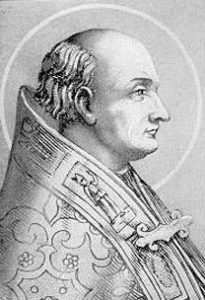
Contemporary accounts
The best way of shewing the thoughts and motives of those concerned in the transaction is to transcribe the narratives of three contemporary, or almost contemporary annalists, two of them German and one Italian. The Annals of Lauresheim say:—
‘And because the name of Emperor had now ceased among the Greeks, and their Empire was possessed by a woman, it then seemed both to Leo the Pope himself, and to all the holy fathers who were present in the selfsame council, as well as to the rest of the Christian people, that they ought to take to be Emperor Charles king of the Franks, who held Rome herself, where the Cæsars had always been wont to sit, and all the other regions which he ruled through Italy and Gaul and Germany; and inasmuch as God had given all these lands into his hand, it seemed right that with the help of God and at the prayer of the whole Christian people he should have the name of Emperor also. Whose petition king Charles willed not to refuse, but submitting himself with all humility to God, and at the prayer of the priests and of the whole Christian people, on the day of the nativity of our Lord Jesus Christ he took on himself the name of Emperor, being consecrated by the lord Pope Leo.’
Very similar in substance is the account of the Chronicle of Moissac (ad ann. 801):—
‘Now when the king upon the most holy day of the Lord’s birth was rising to the mass after praying before the confession of the blessed Peter the Apostle, Leo the Pope, with the consent of all the bishops and priests and of the senate of the Franks and likewise of the Romans, set a golden crown upon his head, the Roman people also shouting aloud. And when the people had made an end of chanting the Laudes, he was adored by the Pope after the manner of the emperors of old. For this also was done by the will of God. For while the said Emperor abode at Rome certain men were brought unto him, who said that the name of Emperor had ceased among the Greeks, and that among them the Empire was held by a woman called Irene, who had by guile laid hold on her son the Emperor, and put out his eyes, and taken the Empire to herself, as it is written of Athaliah in the Book of the Kings; which when Leo the Pope and all the assembly of the bishops and priests and abbots heard, and the senate of the Franks and all the elders of the Romans, they took counsel with the rest of the Christian people, that they should name Charles king of the Franks to be Emperor, seeing that he held Rome the mother of empire where the Cæsars and Emperors were always used to sit; and that the heathen might not mock the Christians if the name of Emperor should have ceased among the Christians.’
These two accounts are both from a German source: that which follows is Roman, written probably within some fifty or sixty years of the event. It is taken from the Life of Leo III in the Vitæ Pontificum Romanorum, compiled by Anastasius the papal librarian.
‘After these things came the day of the birth of our Lord Jesus Christ, and all men were again gathered together in the aforesaid basilica of the blessed Peter the Apostle: and then the gracious and venerable pontiff did with his own hands crown Charles with a very precious crown. Then all the faithful people of Rome, seeing the defence that he gave and the love that he bare to the holy Roman Church and her Vicar, did by the will of God and of the blessed Peter, the keeper of the keys of the kingdom of heaven, cry with one accord with a loud voice, ‘To Charles, the most pious Augustus, crowned of God, the great and peacegiving Emperor, be life and victory.’ While he, before the holy confession of the blessed Peter the Apostle, was invoking divers saints, it was proclaimed thrice, and he was chosen by all to be Emperor of the Romans. Thereon the most holy pontiff anointed Charles with holy oil, and likewise his most excellent son to be king, upon the very day of the birth of our Lord Jesus Christ; and when the mass was finished, then after the mass the most serene lord Emperor offered gifts.’
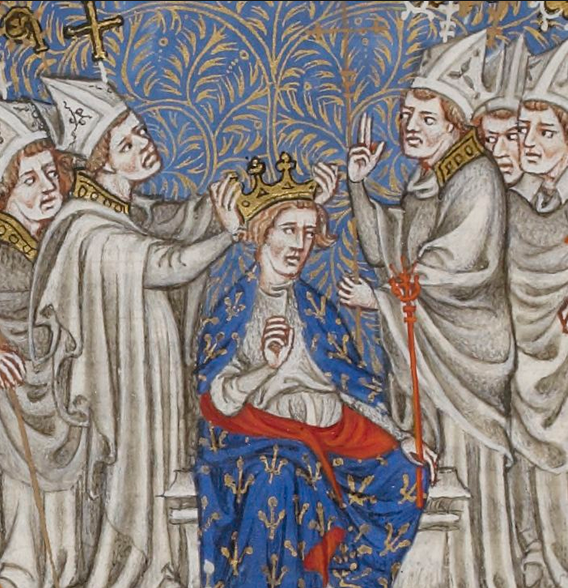
Impression which they convey
In these three accounts there is no serious discrepancy as to the facts, although the Italian priest, as is natural, heightens the importance of the part played by the Pope, while the Germans are too anxious to rationalize the event, talking of a synod of the clergy, a consultation of the people, and a formal request to Charles, which the silence of Eginhard, as well as the other circumstances of the case, forbid us to accept as literally true. Similarly Anastasius passes over the adoration rendered by the Pope to the Emperor, upon which most of the Frankish records insist in a way which puts it beyond doubt. But the impression which the three narratives leave is essentially the same. They all shew how little the transaction can be made to wear a strictly legal character. The Frankish king does not of his own might seize the crown, but rather receives it as coming naturally to him, as the legitimate consequence of the authority he already enjoyed. The Pope bestows the crown, not in virtue of any right of his own as head of the Church: he is merely the instrument of God’s providence, which has unmistakeably pointed out Charles as the proper person to defend and lead the Christian commonwealth. The Roman people do not formally elect and appoint, but by their applause accept the chief who is presented to them. The act is conceived of as directly ordered by the Divine Providence which has brought about a state of things that admits of but one issue, an issue which king, priest, and people have only to recognise and obey; their personal ambitions, passions, intrigues, sinking and vanishing in reverential awe at what seems the immediate interposition of Heaven. And as the result is desired by all parties alike, they do not think of inquiring into one another’s rights, but take their momentary harmony to be natural and necessary, never dreaming of the difficulties and conflicts which were to arise out of what seemed then so simple. And it was just because everything was thus left undetermined, resting not on express stipulation but rather on a sort of mutual understanding, a sympathy of beliefs and wishes which augured no evil, that the event admitted of being afterwards represented in so many different lights. Later theories respecting the coronation. Four centuries later, when Papacy and Empire had been forced into the mortal struggle by which the fate of both was decided, three distinct theories regarding the coronation of Charles will be found advocated by three different parties, all of them plausible, all of them to some extent misleading. The Swabian Emperors held the crown to have been won by their great predecessor as the prize of conquest, and drew the conclusion that the citizens and bishop of Rome had no rights as against themselves. The patriotic party among the Romans, appealing to the early history of the Empire, declared that by nothing but the voice of their senate and people could an Emperor be lawfully created, he being only their chief magistrate, the temporary depositary of their authority. The Popes pointed to the indisputable fact that Leo imposed the crown, and argued that as God’s earthly vicar it was then his, and must always continue to be their right to give to whomsoever they would an office which was created to be the handmaid of their own. Of these three it was the last view that eventually prevailed, yet to an impartial eye it cannot claim, any more than do the two others, to contain the whole truth. Charles did not conquer, nor the Pope give, nor the people elect. As the act was unprecedented so was it illegal; it was a revolt of the ancient Western capital against a daughter who had become a mistress; an exercise of the sacred right of insurrection, justified by the weakness and wickedness of the Byzantine princes, hallowed to the eyes of the world by the sanction of Christ’s representative, but founded upon no law, nor competent to create any for the future.
Was the coronation a surprise?
It is an interesting and somewhat perplexing question, how far the coronation scene, an act as imposing in its circumstances as it was momentous in its results, was prearranged among the parties. Eginhard tells us that Charles was accustomed to declare that he would not, even on so high a festival, have entered the church had he known of the Pope’s intention. Even if the monarch had uttered, the secretary would hardly have recorded a falsehood long after the motive that might have prompted it had disappeared. Of the existence of that motive which has been most commonly assumed, a fear of the discontent of the Franks who might think their liberties endangered, little or no proof can be brought from the records of the time, wherein the nation is represented as exulting in the new dignity of their chief as an accession of grandeur to themselves. Nor can we suppose that Charles’s disavowal was meant to soothe the offended pride of the Byzantine princes, from whom he had nothing to fear, and who were none the more likely to recognise his dignity, if they should believe it to be not of his own seeking. Yet it is hard to suppose the whole affair a surprise; for it was the goal towards which the policy of the Frankish kings had for many years pointed, and Charles himself, in sending before him to Rome many of the spiritual and temporal magnates of his realm, in summoning thither his son Pipin from the war against the Lombards of Benevento, had shewn that he expected some more than ordinary result from this journey to the imperial city. Alcuin moreover, Alcuin of York, the prime minister of Charles in matters religious and literary, appears from one of his extant letters to have sent as a Christmas gift to his royal pupil a carefully corrected and superbly adorned copy of the Scriptures, with the words ‘ad splendorem imperialis potentiæ.’ This has commonly been taken for conclusive evidence that the plan had been settled beforehand, and such it would be were there not some reasons for giving the letter an earlier date, and looking upon the word ‘imperialis’ as a mere magniloquent flourish. More weight is therefore to be laid upon the arguments supplied by the nature of the case itself. The Pope, whatever his confidence in the sympathy of the people, would never have ventured on so momentous a step until previous conferences had assured him of the feelings of the king, nor could an act for which the assembly were evidently prepared have been kept a secret. Nevertheless, the declaration of Charles himself can neither be evaded nor set down to mere dissimulation. It is more just to him, and on the whole more reasonable, to suppose that Leo, having satisfied himself of the wishes of the Roman clergy and people as well as of the Frankish magnates, resolved to seize an occasion and place so eminently favourable to his long-cherished plan, while Charles, carried away by the enthusiasm of the moment and seeing in the pontiff the prophet and instrument of the divine will, accepted a dignity which he might have wished to receive at some later time or in some other way. If, therefore, any positive conclusion be adopted, it would seem to be that Charles, although he had probably given a more or less vague consent to the project, was surprised and disconcerted by a sudden fulfilment which interrupted his own carefully studied designs. And although a deed which changed the history of the world was in any case no accident, it may well have worn to the Frankish and Roman spectators the air of a surprise. For there were no preparations apparent in the church; the king was not, like his Teutonic successors in aftertime, led in procession to the pontifical throne: suddenly, at the very moment when he rose from the sacred hollow where he had knelt among the ever-burning lamps before the holiest of Christian relics—the body of the prince of the Apostles—the hands of that Apostle’s representative placed upon his head the crown of glory and poured upon him the oil of sanctification. There was something in this to thrill the beholders with the awe of a divine presence, and make them hail him whom that presence seemed almost visibly to consecrate, the ‘pious and peace-giving Emperor, crowned of God.’
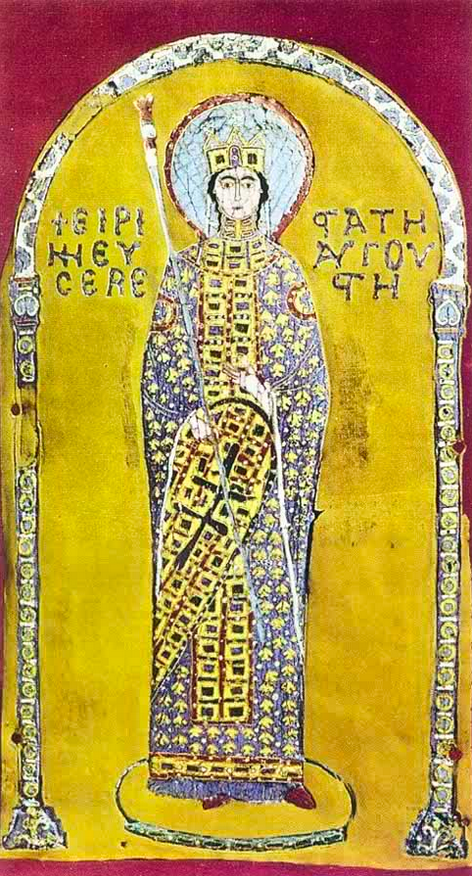
Theories of the motives of Charles
The reluctance of Charles to assume the imperial title is ascribed by Eginhard to a fear of the jealous hostility of the Greeks, who could not only deny his claim to it, but might disturb by their intrigues his dominions in Italy. Accepting this statement, the problem remains, how is this reluctance to be reconciled with those acts of his which clearly shew him aiming at the Roman crown? An ingenious and probable, if not certain solution, is suggested by a recent historian, who argues from a minute examination of the previous policy of Charles, that while it was the great object of his reign to obtain the crown of the world, he foresaw at the same time the opposition of the Eastern Court, and the want of legality from which his title would in consequence suffer. He was therefore bent on getting from the Byzantines, if possible, a transference of their crown; if not, at least a recognition of his own: and he appears to have hoped to win this by the negotiations which had been for some time kept on foot with the Empress Irene. Just at this moment came the coronation by Pope Leo, interrupting these deep-laid schemes, irritating the Eastern Court, and forcing Charles into the position of a rival who could not with dignity adopt a soothing or submissive tone. Nevertheless, he seems not even then to have abandoned the hope of obtaining a peaceful recognition. Irene’s crimes did not prevent him, if we may credit Theophanes, from seeking her hand in marriage. And when the project of thus uniting the East and West in a single Empire, baffled for a time by the opposition of her minister Ætius, was rendered impossible by her subsequent dethronement and exile, he did not abandon the policy of conciliation until a surly acquiescence in rather than admission of his dignity had been won from the Byzantine sovereigns Michael and Nicephorus.
Defect in the title of the Teutonic Emperors
Whether, supposing Leo to have been less precipitate, a cession of the crown, or an acknowledgment of the right of the Romans to confer it, could ever have been obtained by Charles is perhaps more than doubtful. But it is clear that he judged rightly in rating its importance high, for the want of it was the great blemish in his own and his successors’ dignity. To shew how this was so, reference must be made to the events of A.D. 476. Both the extinction of the Western Empire in that year and its revival in A.D. 800 have been very generally misunderstood in modern times, and although the mistake is not, in a certain sense, of practical importance, yet it tends to confuse history and to blind us to the ideas of the people who acted on both occasions. When Odoacer compelled the abdication of Romulus Augustulus, he did not abolish the Western Empire as a separate power, but caused it to be reunited with or sink into the Eastern, so that from that time there was, as there had been before Diocletian, a single undivided Roman Empire. In A.D. 800 the very memory of the separate Western Empire, as it had stood from the death of Theodosius till Odoacer, had, so far as appears, been long since lost, and neither Leo nor Charles nor any one among their advisers dreamt of reviving it. They too, like their predecessors, held the Roman Empire to be one and indivisible, and proposed by the coronation of the Frankish king not to proclaim a severance of the East and West, but to reverse the act of Constantine, and make Old Rome again the civil as well as the ecclesiastical capital of the Empire that bore her name. Their deed was in its essence illegal, but they sought to give it every semblance of legality: they professed and partly believed that they were not revolting against a reigning sovereign, but legitimately filling up the place of the deposed Constantine the Sixth; the people of the imperial city exercising their ancient right of choice, their bishop his right of consecration.
Their purpose was but half accomplished. They could create but they could not destroy: they set up an Emperor of their own, whose representatives thenceforward ruled the West, but Constantinople retained her sovereigns as of yore; and Christendom saw henceforth two imperial lines, not as in the time before A.D. 476, the conjoint heads of a single realm, but rivals and enemies, each denouncing the other as an impostor, each professing to be the only true and lawful head of the Christian Church and people. Although therefore we must in practice speak during the next seven centuries (down till A.D. 1453, when Constantinople fell before the Mohammedan) of an Eastern and a Western Empire, the phrase is in strictness incorrect, and was one which either court ought to have repudiated. The Byzantines always did repudiate it; the Latins usually; although, yielding to facts, they sometimes condescended to employ it themselves. But their theory was always the same. Charles was held to be the legitimate successor, not of Romulus Augustulus, but of Basil, Heraclius, Justinian, Arcadius, and all the Eastern line; and hence it is that in all the annals of the time and of many succeeding centuries, the name of Constantine VI, the sixty-seventh in order from Augustus, is followed without a break by that of Charles, the sixty-eighth.
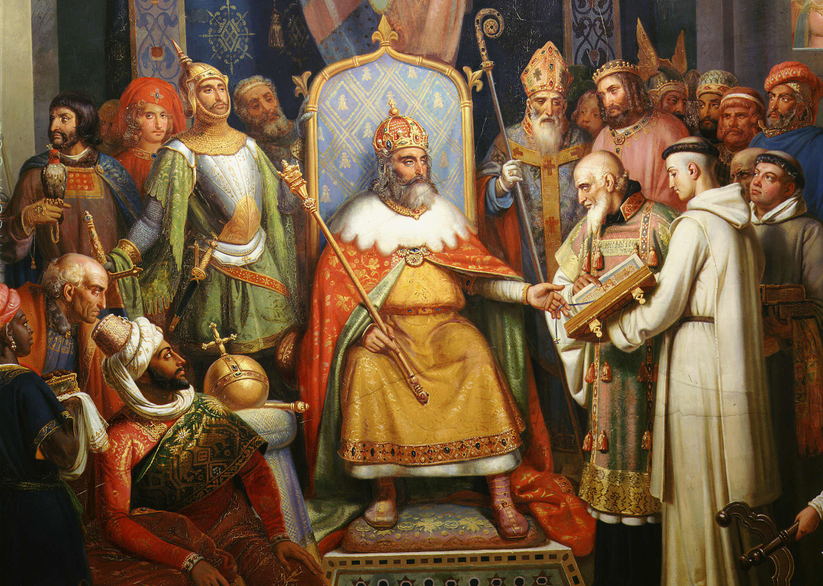
Government of Charles as Emperor
The maintenance of an imperial line among the Greeks was a continuing protest against the validity of Charles’s title. But from their enmity he had little to fear, and in the eyes of the world he seemed to step into their place, adding the traditional dignity which had been theirs to the power that he already enjoyed. North Italy and Rome ceased for ever to own the supremacy of Byzantium; and while the Eastern princes paid a shameful tribute to the Mussulman, the Frankish Emperor—as the recognised head of Christendom—received from the patriarch of Jerusalem the keys of the Holy Sepulchre and the banner of Calvary; the gift of the Sepulchre itself, says Eginhard, from Aaron king of the Persians. Out of this peaceful intercourse with the great Khalif the romancers created a crusade. Within his own dominions his sway assumed a more sacred character. His authority in matters ecclesiastical. Already had his unwearied and comprehensive activity made him throughout his reign an ecclesiastical no less than a civil ruler, summoning and sitting in councils, examining and appointing bishops, settling by capitularies the smallest points of church discipline and polity. A synod held at Frankfort in A.D. 794 condemned the decrees of the second council of Nicæa, which had been approved by Pope Hadrian, censured in violent terms the conduct of the Byzantine rulers in suggesting them, and without excluding images from churches, altogether forbade them to be worshipped or even venerated. Not only did Charles preside in and direct the deliberations of this synod, although legates from the Pope were present—he also caused a treatise to be drawn up stating and urging its conclusions; he pressed Hadrian to declare Constantine VI a heretic for enouncing doctrines to which Hadrian had himself consented. There are letters of his extant in which he lectures Pope Leo in a tone of easy superiority, admonishes him to obey the holy canons, and bids him pray earnestly for the success of the efforts which it is the monarch’s duty to make for the subjugation of pagans and the establishment of sound doctrine throughout the Church. Nay, subsequent Popes themselves admitted and applauded the despotic superintendence of matters spiritual which he was wont to exercise, and which led some one to give him playfully a title that had once been applied to the Pope himself, ‘Episcopus episcoporum.’
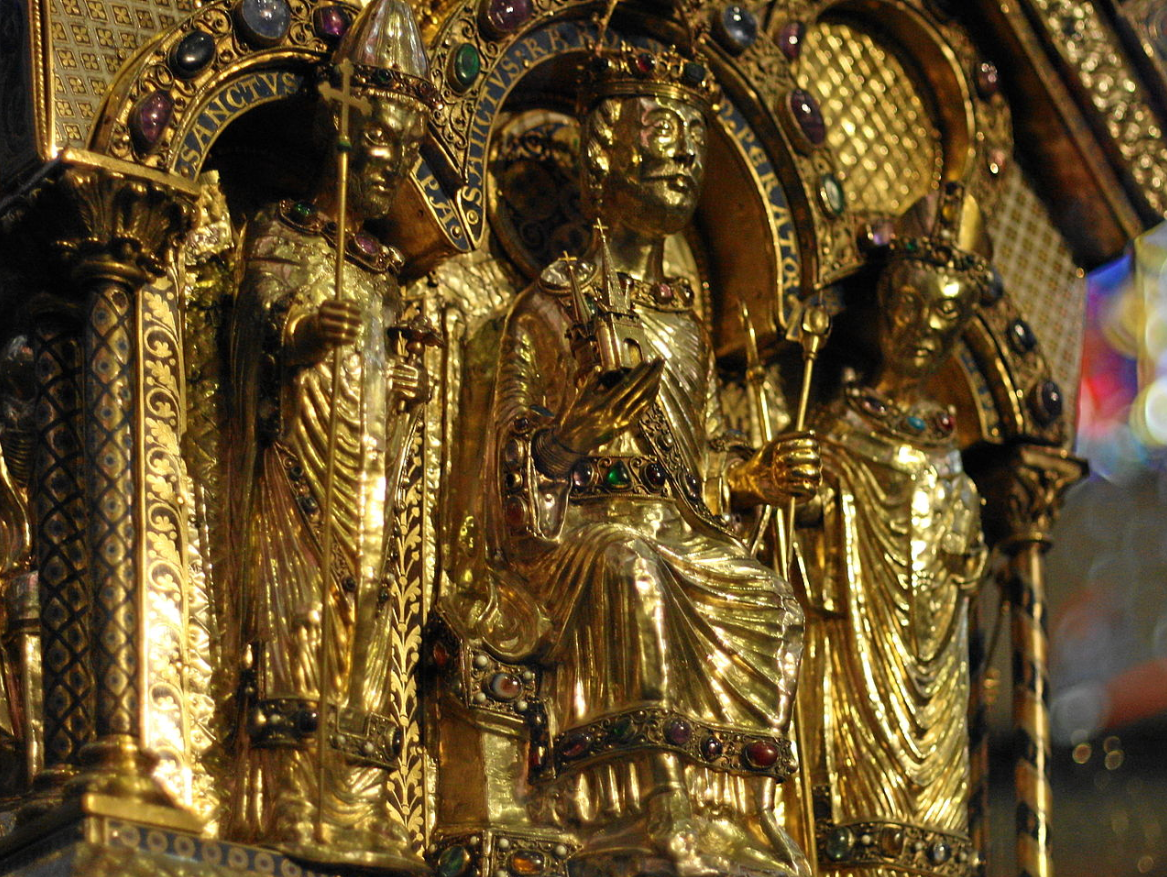
The imperial office in its ecclesiastical relations
Acting and speaking thus when merely king, it may be thought that Charles needed no further title to justify his power. The inference is in truth rather the converse of this. Upon what he had done already the imperial title must necessarily follow: the attitude of protection and control which he held towards the Church and the Holy See belonged, according to the ideas of the time, especially and only to an Emperor. Therefore his coronation was the fitting completion and legitimation of his authority, sanctifying rather than increasing it. We have, however, one remarkable witness to the importance that was attached to the imperial name, and the enhancement which he conceived his office to have received from it. In a great assembly held at Aachen, A.D. 802, the lately-crowned Capitulary of A.D. 802. Emperor revised the laws of all the races that obeyed him, endeavouring to harmonize and correct them, and issued a capitulary singular in subject and tone. All persons within his dominions, as well ecclesiastical as civil, who have already sworn allegiance to him as king, are thereby commanded to swear to him afresh as Cæsar; and all who have never yet sworn, down to the age of twelve, shall now take the same oath. ‘At the same time it shall be publicly explained to all what is the force and meaning of this oath, and how much more it includes than a mere promise of fidelity to the monarch’s person. Firstly, it binds those who swear it to live, each and every one of them, according to his strength and knowledge, in the holy service of God; since the lord Emperor cannot extend over all his care and discipline. Secondly, it binds them neither by force nor fraud to seize or molest any of the goods or servants of his crown. Thirdly, to do no violence nor treason towards the holy Church, or to widows, or orphans, or strangers, seeing that the lord Emperor has been appointed, after the Lord and his saints, the protector and defender of all such.’ Then in similar fashion purity of life is prescribed to the monks; homicide, the neglect of hospitality, and other offences are denounced, the notions of sin and crime being intermingled and almost identified in a way to which no parallel can be found, unless it be in the Mosaic code. There God, the invisible object of worship, is also, though almost incidentally, the judge and political ruler of Israel; here the whole cycle of social and moral duty is deduced from the obligation of obedience to the visible autocratic head of the Christian state.
In most of Charles’s words and deeds, nor less distinctly in the writings of his adviser Alcuin, may be discerned the working of the same theocratic ideas. Among his intimate friends he chose to be called by the name of David, exercising in reality all the powers of the Jewish king; presiding over this kingdom of God upon earth rather as a second Constantine or Theodosius than in the spirit and traditions of the Julii or the Flavii. Among his measures there are two which in particular recall the first Christian Emperor. As Constantine founds so Charles erects on a firmer basis the connection of Church and State. Bishops and abbots are as essential a part of rising feudalism as counts and dukes. Their benefices are held under the same conditions of fealty and the service in war of their vassal tenants, not of the spiritual person himself: they have similar rights of jurisdiction, and are subject alike to the imperial missi. The monarch tries often to restrict the clergy, as persons, to spiritual duties; quells the insubordination of the monasteries; endeavours to bring the seculars into a monastic life by instituting and regulating chapters. But after granting wealth and power, the attempt was vain; his strong hand withdrawn, they laughed at control. Again, it was by him first that the payment of tithes, for which the priesthood had long been pleading, was made compulsory in Western Europe, and the support of the ministers of religion entrusted to the laws of the state.
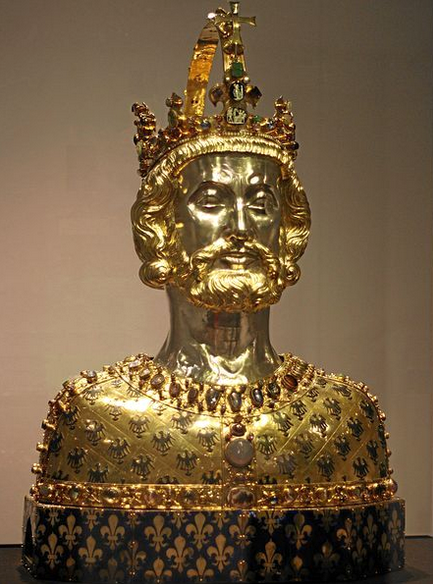
Influence of the imperial title in Germany and Gaul
In civil affairs also Charles acquired, with the imperial title, a new position. Later jurists labour to distinguish his power as Roman Emperor from that which he held already as king of the Franks and their subject allies: they insist that his coronation gave him the capital only, that it is absurd to talk of a Roman Empire in regions whither the eagles had never flown. In such expressions there seems to lurk either confusion or misconception. It was not the actual government of the city that Charles obtained in A.D. 800: that his father had already held as Patrician and he had constantly exercised in the same capacity: it was far more than the titular sovereignty of Rome which had hitherto been supposed to be vested in the Byzantine princes: it was nothing less than the headship of the world, believed to appertain of right to the lawful Roman Emperor, whether he reigned on the Bosphorus, the Tiber, or the Rhine. As that headship, although never denied, had been in abeyance in the West for several centuries, its bestowal on the king of so vast a realm was a change of the first moment, for it made the coronation not merely a transference of the seat of Empire, but a renewal of the Empire itself, a bringing back of it from faith to sight, from the world of belief and theory to the world of fact and reality. And since the powers it gave were autocratic and unlimited, it must swallow up all minor claims and dignities: the rights of Charles the Frankish king were merged in those of Charles the successor of Augustus, the lord of the world. That his imperial authority was theoretically irrespective of place is clear from his own words and acts, and from all the monuments of that time. He would not, indeed, have dreamed of treating the free Franks as Justinian had treated his half-Oriental subjects, nor would the warriors who followed his standard have brooked such an attempt. Yet even to German eyes his position must have been altered by the halo of vague splendour which now surrounded him; for all, even the Saxon and the Slave, had heard of Rome’s glories, and revered the name of Cæsar. Action of Charles on Europe. And in his effort to weld discordant elements into one body, to introduce regular gradations of authority, to control the Teutonic tendency to localization by his missi—officials commissioned to traverse each some part of his dominions, reporting on and redressing the evils they found—and by his own oft-repeated personal progresses, Charles was guided by the traditions of the old Empire. His sway is the revival of order and culture, fusing the West into a compact whole, whose parts are never thenceforward to lose the marks of their connection and their half-Roman character, gathering up all that is left in Europe of spirit and wealth and knowledge, and hurling it with the new force of Christianity on the infidel of the South and the masses of untamed barbarism to the North and East. Ruling the world by the gift of God, and the transmitted rights of the Romans and their Cæsar whom God had chosen to conquer it, he renews the original aggressive movement of the Empire: the civilized world has subdued her invader, and now arms him against savagery and heathendom. Hence the wars, not more of the sword than of the cross, against Saxons, Avars, Slaves, Danes, Spanish Arabs, where monasteries are fortresses and baptism the badge of submission. The overthrow of the Irminsûl, in the first Saxon campaign, sums up the changes of seven centuries. The Romanized Teuton destroys the monument of his country’s freedom, for it is also the emblem of paganism and barbarism. The work of Arminius is undone by his successor.
His position as Frankish king
This, however, is not the only side from which Charles’s policy and character may be regarded. If the unity of the Church and the shadow of imperial prerogative was one pillar of his power, the other was the Frankish nation. The Empire was still military, though in a sense strangely different from that of Julius or Severus. The warlike Franks had permeated Western Europe; their primacy was admitted by the kindred tribes of Lombards, Bavarians, Thuringians, Alemannians, and Burgundians; the Slavic peoples on the borders trembled and paid tribute; Alfonso of Asturias found in the Emperor a protector against the infidel foe. His influence, if not his exerted power, crossed the ocean: the kings of the Scots sent gifts and called him lord: the restoration of Eardulf to Northumbria, still more of Egbert to Wessex, might furnish a better ground for the claim of suzerainty than many to which his successors had afterwards recourse. As it was by Frankish arms that this predominance in Europe which the imperial title adorned and legalized had been won, so was the government of Charles Roman in semblance rather than in fact. It was not by restoring the effete mechanism of the old Empire, but by his own vigorous personal action and that of his great officers, that he strove to administer and reform. With every effort for a strong central government, there is no despotism; each nation retains its laws, its hereditary chiefs, its free popular assemblies. The conditions granted to the Saxons after such cruel warfare, conditions so favourable that in the next century their dukes hold the foremost place in Germany, shew how little he desired to make the Franks a dominant caste.
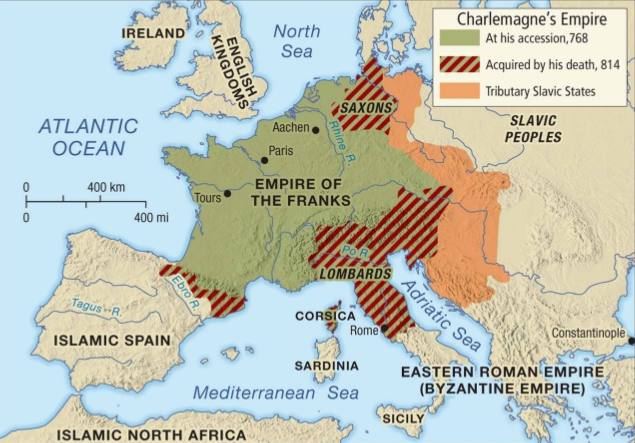
General results of his Empire
He repeats the attempt of Theodoric to breathe a Teutonic spirit into Roman forms. The conception was magnificent; great results followed its partial execution. Two causes forbade success. The one was the ecclesiastical, especially the Papal power, apparently subject to the temporal, but with a strong and undefined prerogative which only waited the occasion to trample on what it had helped to raise. The Pope might take away the crown he had bestowed, and turn against the Emperor the Church which now obeyed him. The other was to be found in the discordance of the component parts of the Empire. The nations were not ripe for settled life or extensive schemes of polity; the differences of race, language, manners, over vast and thinly-peopled lands baffled every attempt to maintain their connection: and when once the spell of the great mind was withdrawn, the mutually repellent forces began to work, and the mass dissolved into that chaos out of which it had been formed. Nevertheless, the parts separated not as they met, but having all of them undergone influences which continued to act when political connection had ceased. For the work of Charles—a genius pre-eminently creative—was not lost in the anarchy that followed: rather are we to regard his reign as the beginning of a new era, or as laying the foundations whereon men continued for many generations to build.
Personal habits and sympathies
No claim can be more groundless than that which the modern French, the sons of the Latinized Kelt, set up to the Teutonic Charles. At Rome he might assume the chlamys and the sandals, but at the head of his Frankish host he strictly adhered to the customs of his country, and was beloved by his people as the very ideal of their own character and habits. Of strength and stature almost superhuman, in swimming and hunting unsurpassed, steadfast and terrible in fight, to his friends gentle and condescending, he was a Roman, much less a Gaul, in nothing but his culture and his width of view, otherwise a Teuton. The centre of his realm was the Rhine; his capitals Aachen and Engilenheim; his army Frankish; his sympathies as they are shewn in the gathering of the old hero-lays, the composition of a German grammar, the ordinance against confining prayer to the three languages,—Hebrew, Greek, and Latin,—were all for the race from which he sprang, and whose advance, represented by the victory of Austrasia, the true Frankish fatherland, over Neustria and Aquitaine, spread a second Germanic wave over the conquered countries.
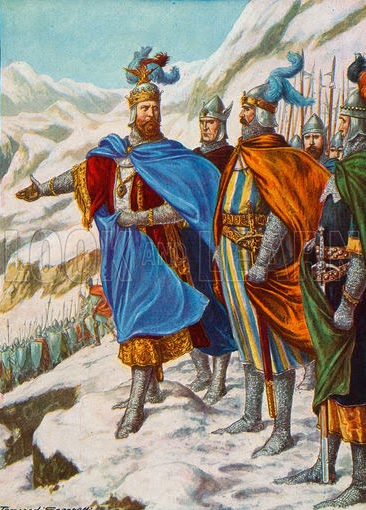
His Empire and character generally
There were in his Empire, as in his own mind, two elements; those two from the union and mutual action and reaction of which modern civilization has arisen. These vast domains, reaching from the Ebro to the Carpathian mountains, from the Eyder to the Liris, were all the conquests of the Frankish sword, and were still governed almost exclusively by viceroys and officers of Frankish blood. But the conception of the Empire, that which made it a State and not a mere mass of subject tribes like those great Eastern dominions which rise and perish in a lifetime, the realms of Sesostris, or Attila, or Timur, was inherited from an older and a grander system, was not Teutonic but Roman—Roman in its ordered rule, in its uniformity and precision, in its endeavour to subject the individual to the system—Roman in its effort to realize a certain limited and human perfection, whose very completeness shall exclude the hope of further progress. And the bond, too, by which the Empire was held together was Roman in its origin, although Roman in a sense which would have surprised Trajan or Severus, could it have been foretold them. The ecclesiastical body was already organized and centralized, and it was in his rule over the ecclesiastical body that the secret of Charles’s power lay. Every Christian—Frank, Gaul, or Italian—owed loyalty to the head and defender of his religion: the unity of the Empire was a reflection of the unity of the Church.
Into a general view of the government and policy of Charles it is not possible here to enter. Yet his legislation, his assemblies, his administrative system, his magnificent works, recalling the projects of Alexander and Cæsar, the zeal for education and literature which he shewed in the collection of manuscripts, the founding of schools, the gathering of eminent men from all quarters around him, cannot be appreciated apart from his position as restorer of the Roman Empire. Like all the foremost men of our race, Charles was all great things in one, and was so great just because the workings of his genius were so harmonious. He was not a mere barbarian warrior any more than he was an astute diplomatist; there is none of all his qualities which would not be forced out of its place were we to characterize him chiefly by it. Comparisons between famous men of different ages are generally as worthless as they are easy: the circumstances among which Charles lived do not permit us to institute a minute parallel between his greatness and that of those two to whom it is the modern fashion to compare him, nor to say whether he was or could have become as profound a politician as Cæsar, as skilful a commander as Napoleon. But neither to the Roman nor to the Corsican was he inferior in that one quality by which both he and they chiefly impress our imaginations—that intense, vivid, unresting energy which swept him over Europe in campaign after campaign, which sought a field for its workings in theology, science, literature, no less than in politics and war. As it was this wondrous activity that made him the conqueror of Europe, so was it by the variety of his culture that he became her civilizer. From him, in whose wide deep mind the whole mediæval theory of the world and human life mirrored itself, did mediæval society take the form and impress which it retained for centuries, and the traces whereof are among us and upon us to this day.
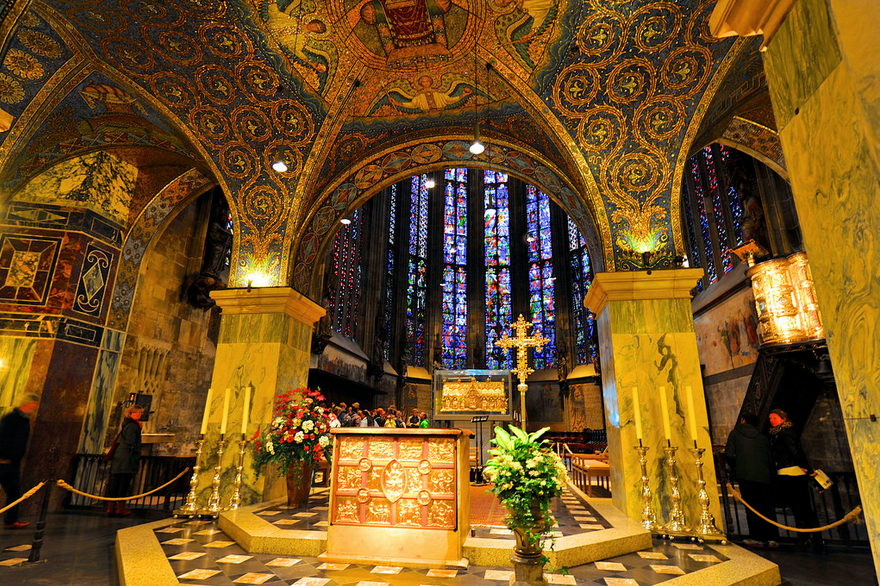
The great Emperor was buried at Aachen, in that basilica which it had been the delight of his later years to erect and adorn with the treasures of ancient art. His tomb under the dome—where now we see an enormous slab, with the words ‘Carolo Magno’—was inscribed, ‘Magnus atque Orthodoxus Imperator.’ Poets, fostered by his own zeal, sang of him who had given to the Franks the sway of Romulus. The gorgeous drapery of romance gradually wreathed itself round his name, till by canonization as a saint he received the highest glory the world or the Church could confer. For the Roman Church claimed then, as she claims still, the privilege which humanity in one form or another seems scarce able to deny itself, of raising to honours almost divine its great departed; and as in pagan times temples had risen to a deified Emperor, so churches were dedicated to St. Charlemagne. Between Sanctus Carolus and Divus Julius how strange an analogy and how strange a contrast!









